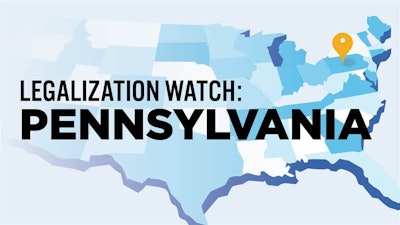
Pennsylvania Gov. Tom Wolf called for adult-use cannabis legalization last week as part of a broader plan to help combat the economic fallout of the ongoing COVID-19 pandemic in a move that has been met with both optimism and skepticism from some industry stakeholders.
“I think it’s got more of a real shot now than it ever has,” Joshua Horn, partner and co-chair of the Cannabis Law Practice at Fox Rothschild, told Cannabis Business Times and Cannabis Dispensary.
While adult-use legalization has strong support from Wolf, Lt. Gov. John Fetterman and the public, the issue has historically lacked the backing it needs from key lawmakers in the state’s Republican-controlled legislature.
For Chris Visco, president and CEO of TerraVida Holistic Centers, one of Pennsylvania’s licensed medical cannabis operators, the legislature’s opposition to legalization means the issue will stall unless Democrats and Republicans can come together to work out their differences.
“Because the governor is a Democrat and the Senate and the House are controlled by Republicans—Republicans who are for legalization but are afraid to say they want it, to say it out loud in public—[Wolf] can’t get it done because he’s a Democrat,” Visco said. “It’s smoke and it’s mirrors. … There is not going to be any legalization from this governor unless Republicans push it forward.”
While Horn also acknowledges that legalization has historically been blocked by the Republican-controlled legislature, he said things could be different now, especially in the wake of the COVID-19 pandemic.
“Pennsylvania’s always had this interesting dynamic with a Democratic governor and a Republican legislature that’s been traditionally against it,” he said. “But what I hear in the trade winds is there are a couple differences now.”
First and foremost, he said, is the state’s multi-billion-dollar budget deficit, which is unlikely to be addressed by raising taxes, particularly during the pandemic.
“You need a new revenue source,” Horn said. “I think some of the Republicans in the House and the Senate are coming around to the idea … that maybe this is something that can help with that.”
Several lawmakers are not up for reelection and will be stepping down at the end of the year, he added, which means they may be more willing to support cannabis policy reform without fear of how it might impact their campaigns.
Horn anticipates seeing a new legalization bill in the coming weeks that takes a fresh approach to the issue in light of the coronavirus pandemic.
While Wolf has left the particulars of legalization up to lawmakers, Horn said the idea has been floated that adult-use cannabis should be regulated and sold through the state’s liquor system, which he said “would be a disaster.”
“You already have experienced companies in the space, so why would you [leave it up to] somebody who clearly doesn’t have the skillset?” Horn said.
Any legalization bill would have to include a robust social equity program, he added, from prioritizing those disproportionately harmed by prohibition in the business licensing process to expunging past cannabis-related convictions.
“I think it was already a big issue that you saw in Illinois, but now because of the events earlier this summer in Minnesota, I quite frankly think it’s even a bigger issue that has to be addressed,” Horn said. “It will be, but it’s just a matter of what it’ll look like.”
Visco agrees that social equity must be addressed in the bill.
“What we need is a true social equity bill that decriminalizes, expunges records, and gives regular, hard-working people an opportunity to come to the table and make money from an industry that has oppressed people of color,” she said. “We need to take the people who have been disproportionately affected by the War on Drugs and let them work in the industry. … It has to be done properly. Legislators can’t be allowed to run amok and put together a bill that looks good but doesn’t help the people who it’s intended to help.”
Home grow is another provision that Visco would like to see in the forthcoming legislation.
“The prohibition of cannabis is a racial principle and it leaves out anybody who’s low-income,” she said. “Cannabis is way too expensive for what it should cost to grow, and everybody’s left behind. People should be allowed to grow their own cannabis.”
While it is unclear what a new legalization bill might look like and whether it will clear the legislature before the current session ends in November, Horn expects Pennsylvania to legalize in the next 12 to 18 months, especially if surrounding states like New Jersey and New York move to legalize. This could be a real possibility, he added, with an adult-use legalization measure on New Jersey’s ballot this year, and New York Gov. Andrew Cuomo’s recent push for legalization.
Also promising, Horn said, is that Wolf attended Cuomo’s Regional Cannabis Regulation and Vaping Summit last fall, where the two joined New Jersey Gov. Phil Murphy and Connecticut Gov. Ned Lamont in discussing a unified approach to legalization and cannabis policy.
“Pennsylvania historically lags behind others in various spaces, but maybe they won’t lag here,” Horn said. “The Republicans are still saying that they’re not really receptive to it, but what I hear back channel is that they may be more receptive to it than in the past. Whether it’s enough to get it passed this year, that I don’t know."

























